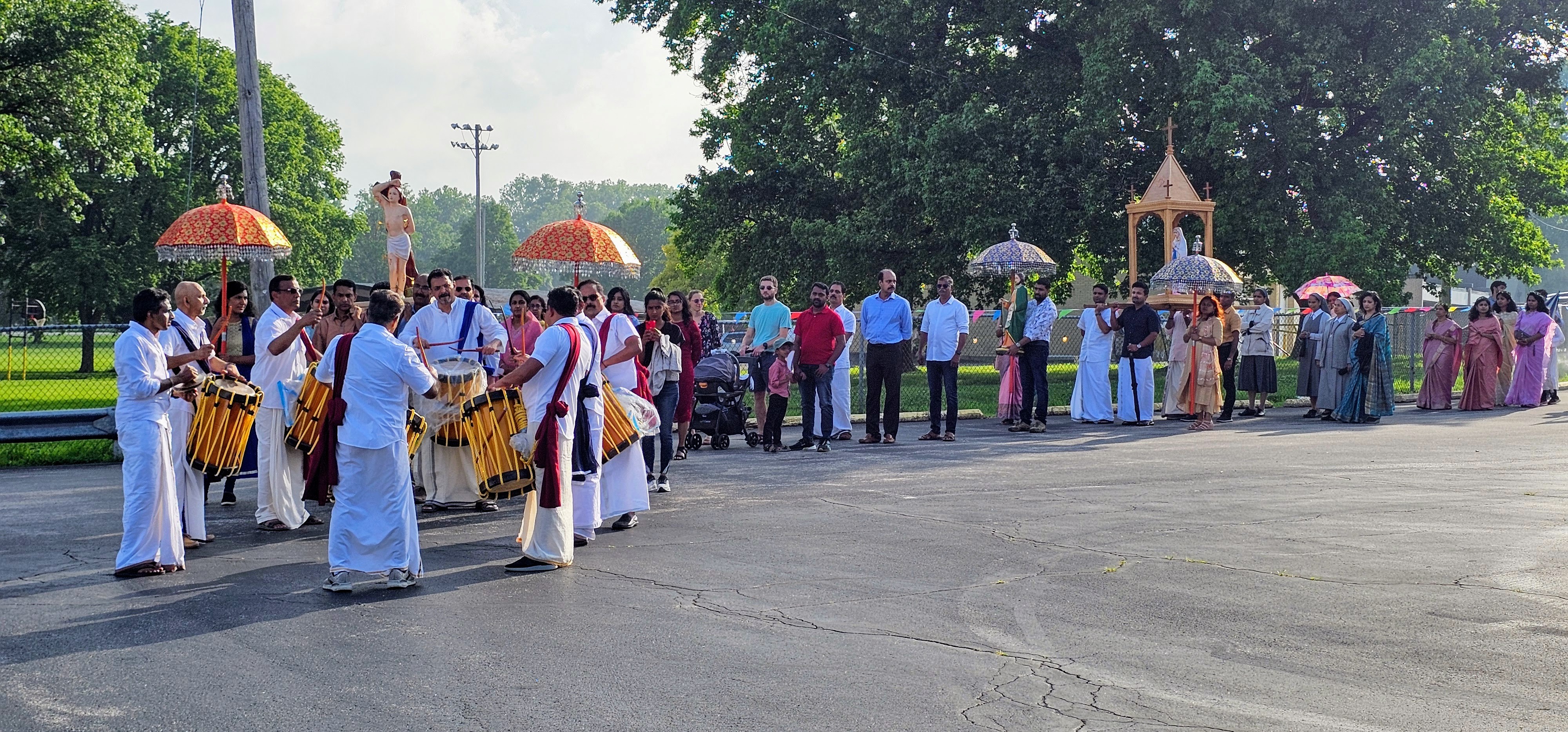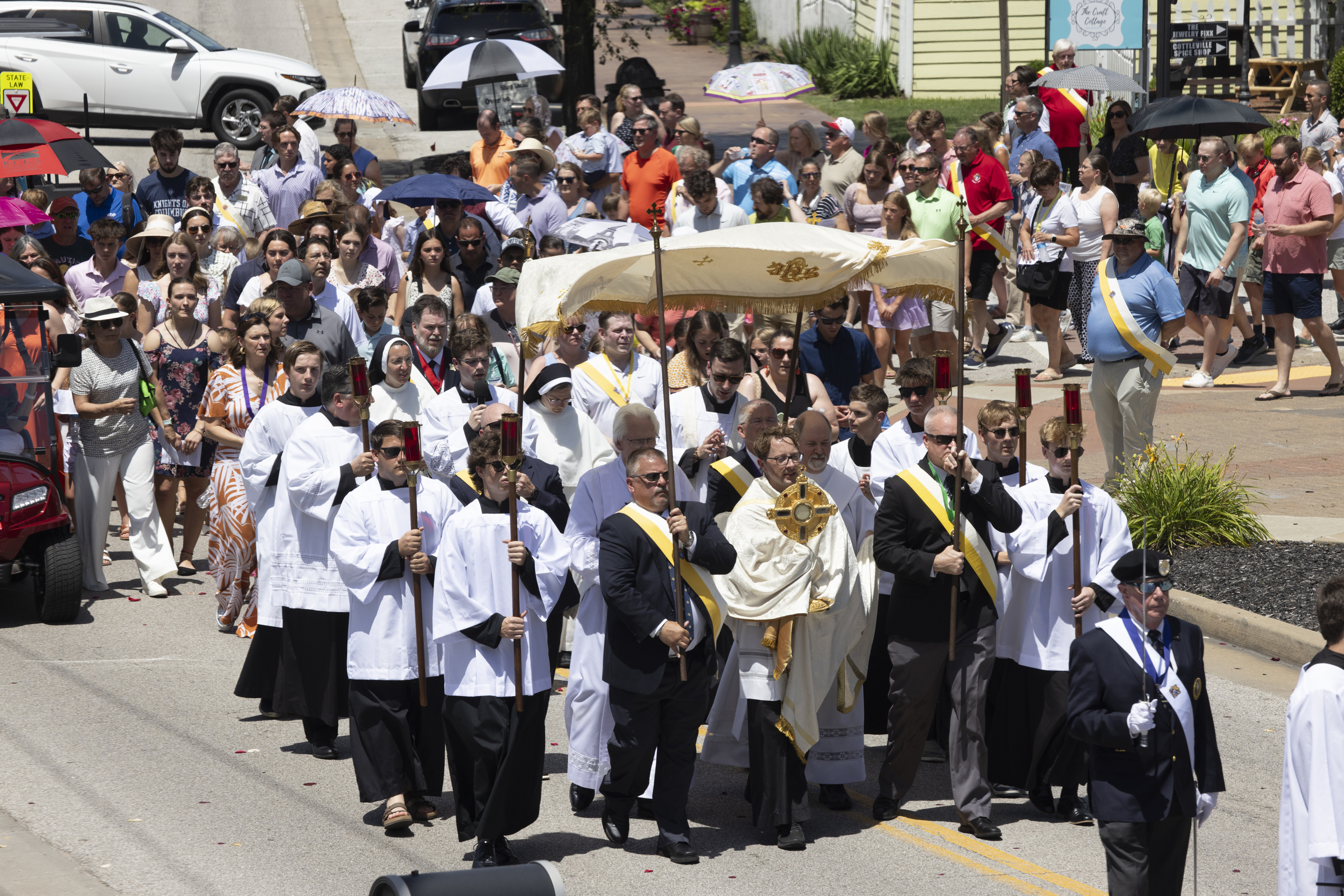The legacy of a gentle soul
Sister Mary Antona Ebo was remembered as a gentle soul whose legacy of standing for justice and equality will continue to live in others.
The Franciscan Sister of Mary was praised at a funeral Mass Nov. 20 at St. Alphonsus Liguori “Rock” Church in north St. Louis. Archbishop Robert J. Carlson presided at the Mass, along with Auxiliary Bishop Mark Rivituso, Bishop Terry Steib of the Diocese of Memphis (a former St. Louis auxiliary bishop), and about two dozen other priests.
Sister Antona, who marched in Selma, Ala., on March 10, 1965, as part of the civil rights movement, died Nov. 11 at The Sarah Community in Bridgeton. She was 93 and was a Franciscan Sister of Mary for 71 years. Among her other accomplishments, Sister Antona was one of the first three African-American women to enter the Sisters of St. Mary (now Franciscan Sisters of Mary). She also had a longtime ministry in health care, including being the first African-American woman to administer a hospital in the United States, at St. Clare Hospital in Baraboo, Wis.
She was involved in interfaith work and other social justice issues and often provided spiritual guidance and support to men and women answering their vocational calling. She visited Ferguson several times after the 2014 death of Michael Brown, where she told others that they must “raise the rug up and look at what’s under the rug” in Ferguson.
Father Manuel Williams, a priest of the Congregation of the Resurrection and longtime friend of Sister Antona, began the homily by singing several lines from an old Negro spiritual, “Ain’t Got Time to Die.”
“I’ve been so busy working for the kingdom … I ain’t got time to die…”
Sister Antona, he said, modeled that spiritual as a disciple of Jesus, working for His kingdom throughout her life. Advocating for justice and mercy was always at the forefront, including in her work for racial equality and in other areas, including nursing and health care administration, hospital chaplain, spiritual director and pastoral associate. With a signature twinkle in her eye, and with a desire to “tell the true truth,” as many recalled, Sister Antona lived to best of her ability the Lord’s command to love others.
“When you read her biography, you think is there anything in the Church she could not do?” Father Williams said. “She did it all with the grace that came from a heart centered on love — a vine attached to Jesus.”
Father Williams recalled talking to Sister Antona in 2015 when they were in Selma for the 50th anniversary of the march. He asked her how it felt to be there 50 years later “knowing that all that you did and thousands of others did, helped to make this country more humane, more just, more free.”
“She looked at me and she began to shake her head, gently. She said, ‘Oh Manny, we have so much more to do.'”
They were words of wisdom, yet also a challenge, Father Williams noted, which must remain a call for us today. “We must continue to start doing more. To take the Lord’s admonition to heart to love one another, to remain in His love, to answer when we are called to speak up and to speak out. To be willing, like Mother Antona, to go to distant places.”
Father Williams also recalled her famous words at Selma: “I’m here because I’m a Negro, a nun, a Catholic, and because I want to bear witness.” We must keep the Lord’s commandment to have a “holy joy,” he said, even in the midst of the storms, and to say “yes” to being chosen by God.
Among those at the Mass were several cousins and a great-nephew, Aaron Ebo, and his wife, Isabel, from Sacramento, Calif. Ebo recalled visiting St. Louis for his great-aunt’s 90th birthday celebration. “My favorite thing was her sense of humor,” he recalled. “She had so many good stories to tell. I remember when we visited, we spent most of the time in her apartment going through scrapbooks, talking about the Ebo side of the family.”
Yvonne Bratton, a cousin from Buffalo, N.Y., recalled seeking Sister Antona’s counsel as she was going through a tough time in her life and needed some help deciphering Scripture. “I became a much stronger person, because who else is there to go to but Sister Toni to interpret the Lord? I’ve been blessed by her life.”
Among the items placed upon Sister Antona’s casket at the Mass were her Bible, her vow formula and rosary, framed pictures of her parents and from her time in Selma, and an Afrocentric cross. All of them were symbols of what was most important to her and how she lived her faith.
Bill Manion of Wisconsin recalled how she lived her faith, even in the behind the scenes moments of life. Manion and his brother, Dick, got to know Sister Antona through their mother, JoAnne, who worked with the woman religious in health care in Wisconsin. Sister Antona would often join the family for Thanksgiving and Christmas and other family gatherings throughout the year.
“She was very thoughtful, very peaceful,” Bill Manion said. “She definitely lived her faith.
Catholic evangelist Richard Lane said Sister Antona’s spirit will live on as an important figure in African-American Catholic history. Lane, who is from St. Louis, had mentioned Sister Antona’s legacy several weeks ago to a group of young people at a retreat at Holy Name of Jesus Catholic Church in Los Angeles.
“I wanted to ensure they knew the power and the gifts that Antona left us,” he said. “One of the things she said when she went to Selma is that she just wanted to blend in. … But the Lord said, ‘No, I need you in a greater role’ And she was prepared to answer the call. I encouraged the youth there to always be prepared to answer the call no matter where you are.”
Sister Mary Antona Ebo was remembered as a gentle soul whose legacy of standing for justice and equality will continue to live in others. The Franciscan Sister of Mary was … The legacy of a gentle soul
Subscribe to Read All St. Louis Review Stories
All readers receive 5 stories to read free per month. After that, readers will need to be logged in.
If you are currently receive the St. Louis Review at your home or office, please send your name and address (and subscriber id if you know it) to subscriptions@stlouisreview.com to get your login information.
If you are not currently a subscriber to the St. Louis Review, please contact subscriptions@stlouisreview.com for information on how to subscribe.







